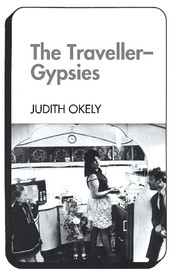Book contents
- Frontmatter
- Contents
- Dedication
- Preface
- 1 Historical categories and representations
- 2 Modern misrepresentations
- 3 Methods of approach
- 4 Economic niche
- 5 Self-ascription
- 6 Symbolic boundaries
- 7 Gorgio planning
- 8 Travelling
- 9 The trailer unit, spouses and children
- 10 Group relations and personal relatives
- 11 Gypsy women
- 12 Ghosts and Gorgios
- Concluding remarks
- Extract from The Scholar Gypsy
- Notes
- References
- Index
8 - Travelling
Published online by Cambridge University Press: 04 December 2009
- Frontmatter
- Contents
- Dedication
- Preface
- 1 Historical categories and representations
- 2 Modern misrepresentations
- 3 Methods of approach
- 4 Economic niche
- 5 Self-ascription
- 6 Symbolic boundaries
- 7 Gorgio planning
- 8 Travelling
- 9 The trailer unit, spouses and children
- 10 Group relations and personal relatives
- 11 Gypsy women
- 12 Ghosts and Gorgios
- Concluding remarks
- Extract from The Scholar Gypsy
- Notes
- References
- Index
Summary
The Gypsies' need for intermittent access to land, over which they also have minimum control, has been a major source of conflict with the dominant society. Their requirements are more often for flexibility and mobility, rather than for permanent residence. The Gypsies' movements, like those of so many other nomads, are misconstrued and seen either as irrational and unpredictable or as a response to some compelling urge or ‘tradition’. In the study of nomads, detailed case studies and specificities are still hard to come by (Dyson-Hudson 1972:8-9). With regard to Gypsies, the Cripps Report recommended that government departments ‘undertake or initiate research or experiments on such subjects as travelling patterns’ (1976:36). This chapter aims to provide a detailed account of aspects of the Travellers' movements and struggle for the use of land during my fieldwork.
The Gypsies do not travel about aimlessly, as either the romantics or the anti-Gypsy suggest. Neither do their movements follow fixed and invariable routes. The Travellers' movements are governed by a complex inter-relation of political, economic and ideological factors. There are some broad seasonal patterns, some historical regularities in these, and other influences like work opportunities and relations with both local Gorgios and Gypsies.
Seasonal and historical regularities
Seasonal regularities in movement are influenced partly by the Gorgio economy, especially the demands of agriculture. Many Travellers in this study moved to rural areas at certain times for casual farm work.
- Type
- Chapter
- Information
- The Traveller-Gypsies , pp. 125 - 151Publisher: Cambridge University PressPrint publication year: 1983



